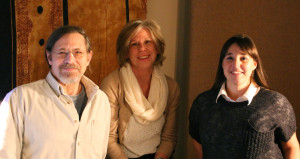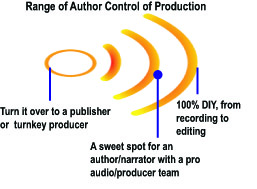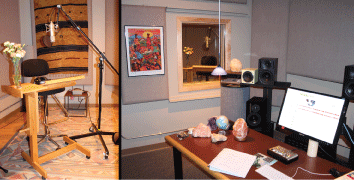Airshow engineers Jon Gold and Anna Frick and I pooled our thoughts on how independent authors could take advantage of pro technical resources and create their ideal audiobook on a real-world budget. In this post, we cover pre-production decisions authors face in creating their audiobook. In the next post, we share tips about recording an audiobook and describe the post-production steps to create a polished, professional audiobook. In the third post, we tie it all together and explore a budget for a 200-page, 50,000-word audiobook narrated by the author.
Download FREE Audiobook Production Whitepaper
-

-
Jon Gold has extensive experience recording, editing and mastering spoken word audio for a variety of media. Anna Frick (right) spent the first four years of her career with a leading multimedia publisher of titles about spirituality, yoga and self-empowerment
A fast-growing market
The ease of creating and retailing audiobooks has led to an explosion of audiobook releases by independent authors and the growth of a vibrant ecosystem for their production and distribution. This trend follows the pattern that independent authors have enjoyed in the ebook marketplace. Self-publishing authors, and in particular those writing in self-help/motivational, spiritual, or business book categories, find a ready audience for audiobooks among the affluent, educated audiobook customer base. Some of these authors creating audiobooks may want to put their words into an actual physical book to appeal to a wider range of readers, this will bring them more exposure as most of the work is done, they’ll only need to figure out a few things such as a book cover design to visually appeal to audiences.
As Amazon’s Kindle marketplace is the major retailer of ebooks, likewise Amazon-owned Audible.com’s subscription service facilitates audiobook consumption. iTunes is also a prime outlet for audiobooks, offering thousands of titles as downloads. There are at least a dozen more general interest online audiobook retailers, in addition to numerous special-interest sites selling audiobooks to their niche. The audiobook market in the U.S. is estimated at $1.2 billion. By way of comparison, recorded music sales in the U.S. are estimated at around $7 billion annually.
Audiobook authors we interviewed are enthusiastic about repurposing their written works for new audiences. They feel audiobooks give them another content product for their catalogs at a reasonable cost, and an opportunity for their works to be discovered anew.
To make smart business decisions about an audiobook, an author needs to do some market research, as pricing varies widely among genres, retail outlets, and even among release formats. Research includes comparing prices of downloads and CD box versions of audiobooks, as well as learning about the level of production common among publishers in the author’s genre.
A continuum of creative control
In audiobook production, there is a continuum of author involvement with the process, from hands off to 100{78247d6b22ac27135341102d75ec43dc193986201927d8d8e39f5e476ed6f5be} DIY.

In a hands-off scenario, an audiobook publisher may afford the author little say in the choice of a narrator or in the resulting audio content, including details like emphasis, pacing, and segment or track divisions. Likewise, posting an ebook to ACX (Amazon’s Audiobook Creation Exchange for production and distribution) can yield a narrator, producer, and engineer to take on the project, but the author’s level of involvement may be limited, especially if he or she is working remotely with an ACX team.
At the other end of the spectrum is the total creative control that results when the author is the narrator, producer, and recording engineer.
In our discussions with independent authors, we learned that they value both creative control and budget control of their projects. Their appetite for tackling the technical aspects of the audiobook creation process varies.
Pre-production: Decisions to make
To arrive at some of the decisions you’ll be making during pre-production, we strongly suggest that you listen to other audiobooks in your field. Find peers, competitors, and the superstars in your area of expertise and listen critically to their audiobooks. You’ll learn whether you need to use music in your presentation, what clean editing sounds like (and perhaps what bad recording sounds like, too!), and how your own spoken presentation compares to others whose work you enjoy hearing.
1. What is your audiobook content? Will your work mimic your written ebook? Will it be a stand-alone audio product (perhaps based on a successful talk or seminar you developed)? If your ebook relies on charts or exercises, your audiobook may benefit from text supplements or online video supplements your listeners can access.
Whispersync™ may inform your production decisions. Whispersync™ is the Amazon technology that enables a Kindle reader to buy the companion audiobook and switch between the two media. To work together, your audiobook must track very closely with your ebook. This is something to consider as you decide the content of your audiobook.
2. Will your audiobook be released as a digital download only? Or will you also press a CD version? Your decision will be driven by several considerations: the incremental cost to manufacture multi-CD packages, the demographics of your audience, and the sales venues open to you.
If you conduct in-person seminars or sell information to organizations who bulk-buy, then physical audiobooks may be a profitable choice because you have sales venues that will generate retail or near-retail income to you.
If you are going to sell physical CDs, your book will be subject to the CD format’s 80-minute maximum length, necessitating decisions about breaks in the audio that may not mirror chapter breaks. If your reading audience skews older (averaging 51+ years), research says you have an audience of listeners who mostly prefer CDs over digital downloads, which are preferred by younger listeners.
3. Who will narrate your audiobook? For fiction it’s almost a must to hire a narrator, but in nonfiction you have latitude. Professional narrators often work from home studios and essentially “produce” the audiobook themselves. By virtue of their full control of production, they will be making decisions large and small that will determine the sound of your audiobook.
The decision about who narrates your audiobook may be driven by your judgment of who your readers want to hear, your own reading/speaking skill, and cost. If the audiobook you hear in your head includes your voice, then by all means, follow your muse. Do some test recordings using your mobile device, and critique them. If you have a coach who has worked with you on public speaking, get your coach’s feedback, too. Recording an audiobook has been known to give some authors slight anxiety. This is down to the fear of recording their own voice and the fear of them messing up. This can make the recording process quite stressful for authors, leading to them making more mistakes, creating more anxiety. However, it’s been recommended that some authors consider trying to relax before they enter the recording studio. There are many ways to do this, but one of the easiest methods is by using some CBD oils. A lot of authors have used this method before and have found it significantly effective. To try some of these products, it might be worth using some of these CBD Coupons here. Hopefully, CBD oils will be able to reduce some of the anxiety that you might have going into recording your audiobook.
4. Who will produce your audiobook? The producer’s job is to direct the actions of the narrator and the engineer to create the sound of the audiobook. In the studio, the producer is focused solely on the content. Tasks involve establishing pacing, listening critically to the recording as it’s being made, calling for retakes, and overseeing the editing of the narrated components into the finished whole. Selection of music, if used in an audiobook, is a producer’s task.
If you feel you can be objective about how your reading sounds and make judgments about inflection, pace, vocal traits, and retakes, then you can be your own producer. If you work with a professional engineer experienced in audiobook production, you may find you can perform the producer tasks without compromising your narrator duties.

-
Airshow’s studios are well-equipped for an author to self-produce an audiobook, with the support of experienced engineers in a studio purpose-built for voice-over recording.
5. Who will record your audiobook? Do you have a home studio, one with good sound isolation, a recorder you understand, and a good mic? If so, you can be your own engineer, freed from budget constraints for studio rental. Setting up a studio of your own can be quite a fun prospect – besides from the various pieces of audio equipment, you can get office furniture from here as you’ll likely need a chair and desk when it comes to sitting down to edit your recordings. If that doesn’t sound like fun to you, remember that the plus side of paying to record in a professional studio is that the sonic variables are under control; the work you do-expressing your ideas, effectively conveying your information-will be correctly and consistently captured.
6. Who will edit your audiobook? In a project with a separate producer, the producer may perform the edits either alone or side by side with the engineer. If you are the producer, your engineer can edit your audiobook in collaboration with you.
Your answers to these pre-production questions will help determine your production process and your budget, topics covered in Part II and Part III of this series.
